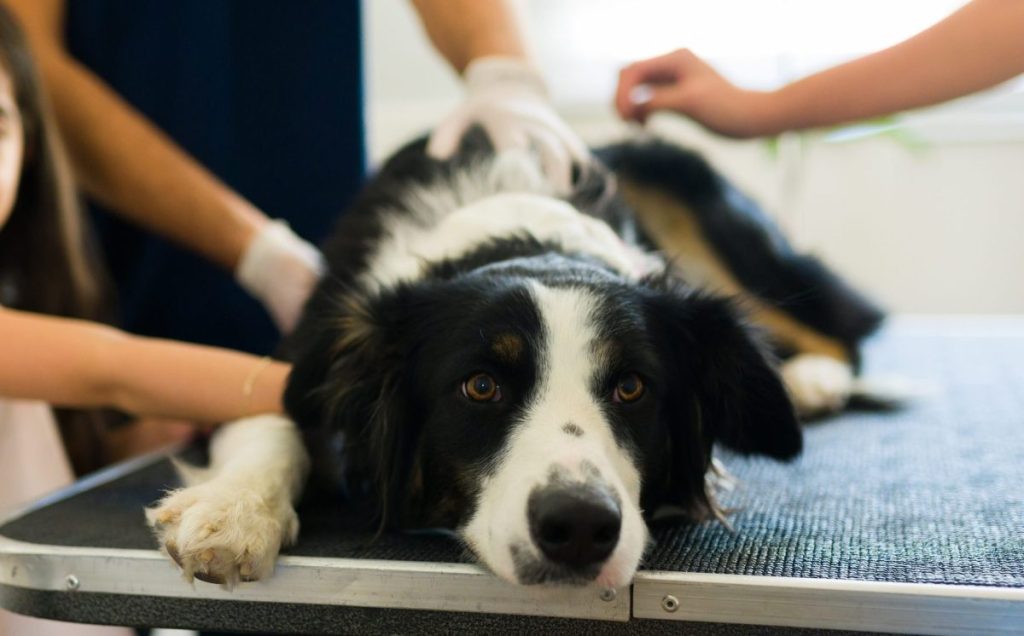Canine colitis is an inflammation of the colon in dogs and is responsible for some 50 percent of cases of chronic diarrhea. While not a life-threatening condition, it certainly requires a consultation from your veterinarian. Here’s everything you should know about colitis in dogs.
What are the symptoms of colitis in dogs?
A major obvious symptom of colitis is diarrhea, though it can also result in constipation. While your veterinarian can diagnose colitis based on symptoms, treatment depends on the nature of the diarrhea. Is it acute (i.e., has it appeared suddenly), chronic (ongoing for several weeks), or episodic (recurring time after time)?
The following characteristics are commonly found in colitis of the large intestine:
- Straining during defecation and a sense of sudden urgency
- Fresh blood found in the stool
- Mucus in the stool
- Stools that start normal and finish loose
- The stool is often gooey or slimy as opposed to watery
- Passing gas
- Dehydration from loss of fluids
What causes colitis in dogs?
Colitis in dogs can be caused by stress, parasites (including whipworms or Giardia), trauma, allergies, inflammatory bowel disease, and infections including E. coli, Salmonella, and Clostridium. Contact with infected dogs, contaminated food, or overexposure to wet environments can also cause colitis.
If your dog suddenly develops colitis, it may be induced by stress from events such as boarding, moving, severe weather, or some other lifestyle change, or it could be from a dietary indiscretion, such as eating from the garbage can, consuming too many treats, or having a sudden change in diet. These cases can usually be cleared up with proper medication and diet therapy.
Chronic or episodic colitis in dogs
If your dog’s colitis symptoms persist for over a month, your veterinarian will run tests to discover the cause. The tests will include evaluating your dog’s blood chemistry, a red and white cell profile (called a CBC), and a fecal test for parasites.
They may also need to test the pancreas for its ability to produce digestive enzymes. A veterinarian should perform a fecal smear or cytology test under the microscope to check for pathogenic bacteria that can cause colitis, especially Clostridial organisms.
Whipworms are a common cause of colitis in dogs, but they are difficult to detect. If your veterinarian suspects whipworms, they may suggest treatment for the whipworm and see if that resolves the problem.
Other parasites in different parts of the digestive tract can usually be treated readily with medicine, but whipworms can be difficult to eradicate, and a multistep deworming process is usually necessary.
Other causes of colitis in dogs
There are many possible causes of canine colitis, and your veterinarian must run tests to determine how to proceed with treatment and how to deal with underlying factors that may worsen the condition.
Here are a few other possible causes of canine colitis:
- Chronic Inflammatory Bowel Disease: This is a group of diseases of the small and large intestines in which the dog’s immune system, reacting to an allergen or infection, attacks the lining of the intestine. Although treatable, it’s seldom curable.
- Foreign bodies: Grass and straw contains lots of indigestible fiber that can irritate the colon. Dogs who eat any nonfood material are always at risk of suffering from periodic bouts of colitis.
- Irritable Bowel Syndrome: Most commonly found in stressed or highly excitable dogs, this condition often has a neurological or psychological cause.
- Allergies or dietary intolerance: Food allergies can especially cause inflammation in the digestive tract that leads to symptoms of colitis. Intolerance to certain types of food such as wheat or lactose can also cause inflammation.
- Infection: Viral or bacterial infection usually causes an immune system response which results in inflammation.
- Bowel cancer: This is especially the case with older dogs.
- Reaction to medication: Some antibiotics can interact poorly with your dog’s digestive system and kill off good bacteria that aid the digestion process, resulting in upset.
Preventing, managing, & treating canine colitis
You can’t prevent every cause of colitis — sometimes it’s just out of your control. You can, however, be sure your dog gets a high-fiber diet and plenty of water. Additionally, try to keep them from eating any nonfood materials. Grass, fabric, and table-scrap bones all are very hard on the digestive system and can cause problems.
The best way to manage colitis is to get an accurate diagnosis and use the specific therapy designed for that condition. If this is not possible, your veterinarian may try to treat the symptoms as they arise to control the problem.
Listed below are medications and strategies that can be useful in the management and treatment of your dog’s colitis.
Metronidazole
This is an anti-inflammatory medication helpful in the large intestine, and it’s able to kill harmful organisms such as Clostridia and Giardia.
Sulfasalazine
This medication is a sulfa antibiotic surrounding a salicylate anti-inflammatory. The sulfa bond keeps the anti-inflammatory medication intact through the stomach until it reaches the large intestine. While it is an effective medication, some pet parents have trouble medicating their dogs three times a day, which is necessary.
Dietary Fiber
There are three types of fiber: soluble, insoluble, and mixtures. In general, vets believe colitis is a fiber-responsive disease. The fibers are broken down into food for beneficial colon bacteria and to provide nutrients for colon cells.
Fructooligosaccharides (FOS)
Some dog food manufacturers make a prescription diet that emphasizes the addition of FOS to its formulation. FOSs are carbohydrates connected with fructose (fruit sugar) units that attach to glucose (starch sugar) units. Tests have shown that this substance helps remove pathogenic (disease-causing) bacteria from the large intestine and promotes the growth of good bacteria. Diets containing FOSs may help control colitis.
Elimination Diet
Colitis can result from food intolerance, either to a specific food or to preservatives, dyes, fillers, contaminants, or even the natural proteins in the food. An elimination diet is an easy way to determine a food allergy in your dog, and is less expensive than standard skin testing.
Treating Clostridium
Clostridial organisms are a group of anaerobic bacteria, meaning they cannot survive in the presence of oxygen. They’re responsible for such diseases as tetanus, botulism, and gangrene. While some Clostridial organisms normally live in the large intestine, they don’t cause problems unless the dog becomes stressed or has a diet change that allows them to overgrow. Once they have grown to a large number, the high level of toxins they produce can cause colitis.
Prednisone
This is still the leading weapon in the treatment of inflammatory bowel disease, which must be diagnosed by biopsy. Your vet will sometimes suggest a trial course of prednisone to treat the colitis.









